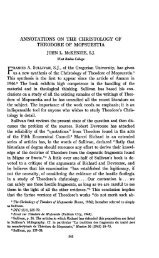Two Concepts of Attrition and Contrition - Theological Studies
Two Concepts of Attrition and Contrition - Theological Studies
Two Concepts of Attrition and Contrition - Theological Studies
Create successful ePaper yourself
Turn your PDF publications into a flip-book with our unique Google optimized e-Paper software.
22 THEOLOGICAL STUDIES<br />
2) The sacrament <strong>of</strong> penance, according to St. Thomas, is the means<br />
instituted by Christ to restore grace to repentant Christian sinners;<br />
but it supposes in them the necessary disposition for justification,<br />
namely contrition. It does not dispense with this disposition, nor does<br />
it make up for the lack <strong>of</strong> it. If necessary, it produces this disposition<br />
that it may then (sequence <strong>of</strong> nature, not <strong>of</strong> time) give the grace. The<br />
function <strong>of</strong> the sacrament is properly to transmit the grace, not to<br />
replace the subjective dispositions <strong>of</strong> the penitent. 79 According to the<br />
moderns, the sacrament makes up for the imperfect dispositions <strong>of</strong> the<br />
penitent. Its proper function is to make the recovery <strong>of</strong> sanctifying<br />
grace easier by dem<strong>and</strong>ing from the penitent a less perfect disposition<br />
for it. Else, they argue, if one requires for justification in the sacrament<br />
the same perfect contrition which justifies a sinner by itself, what<br />
then is left to the proper efficiency <strong>of</strong> the sacrament? 80<br />
Content <strong>and</strong> extension <strong>of</strong> the notions <strong>Attrition</strong>-<strong>Contrition</strong> in each <strong>of</strong><br />
these schools.<br />
We no doubt are faced here with two disparate theories. Yet under<br />
this difference in conceiving <strong>and</strong> expressing the process <strong>of</strong> justification<br />
in the sacrament <strong>of</strong> penance both theories agree to a large extent in the<br />
reality they endeavor to express, on account <strong>of</strong> the diverse content <strong>and</strong><br />
extension each <strong>of</strong> them gives to the notions <strong>of</strong> attrition-contrition.<br />
Some attrition <strong>of</strong> the moderns, that is, a sorrow for sin motivated<br />
by interested reasons, is in fact identical with contrition in the sense<br />
<strong>of</strong> St. Thomas, namely, with the contrition objectively or ontologically<br />
79 Cf. De Vooght, La Causality p. 665: "Le sacrement n'a qu'une fonction transmettrice,"<br />
Dondaine, op. cit., p. 12.<br />
80 Cf. Galtier, op. cit., p. 291: "Sacramentum non posset umquam producere effectum<br />
ad quern per se instituturn est." Is it necessary to say that this argument is beside the<br />
point? In St. Thomas' conception contrition itself justifies only ex voto clavium; as a part<br />
<strong>of</strong> the sacrament it works together with the absolution. Absolution is not the whole sacrament<br />
<strong>and</strong> its proper role is to "inform" or "sacramentalize" the matter, namely the acts<br />
<strong>of</strong> the penitent. Its efficiency is not opposed to that <strong>of</strong> contrition but joined to it. <strong>Contrition</strong><br />
itself works only in so far as the power <strong>of</strong> the keys is active in it—per votum. The<br />
forgiveness <strong>of</strong> sins is the effect <strong>of</strong> the sacrament as one cause acting per modum unius,<br />
not <strong>of</strong> the absolution only. The other objection, that in the Thomist position penance<br />
would no longer be a "sacramentum mortuorum," because it would always presuppose the<br />
state <strong>of</strong> grace (cf. Galtier, loc. cit.) also rests on an ignorantia elenchi. The penitent was not<br />
in a state <strong>of</strong> grace when the sacrament exerted its efficiency in the very contrition.

















